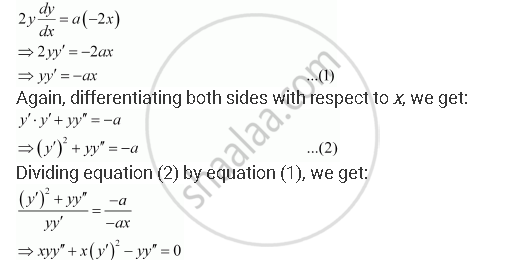Advertisements
Advertisements
प्रश्न
Form a differential equation representing the given family of curves by eliminating arbitrary constants a and b.
y2 = a (b2 – x2)
उत्तर
y2 = a (b2 – x2)
Differentiating both sides with respect to x, we get:

This is the required differential equation of the given curve.
APPEARS IN
संबंधित प्रश्न
Write the integrating factor of the following differential equation:
(1+y2) dx−(tan−1 y−x) dy=0
Find the differential equation of the family of lines passing through the origin.
Find the differential equation representing the family of curves v=A/r+ B, where A and B are arbitrary constants.
Form a differential equation representing the given family of curves by eliminating arbitrary constants a and b.
y = ex (a cos x + b sin x)
Find the particular solution of the differential equation (1 + e2x) dy + (1 + y2) ex dx = 0, given that y = 1 when x = 0.
Find a particular solution of the differential equation (x - y) (dx + dy) = dx - dy, given that y = -1, when x = 0. (Hint: put x - y = t)
The general solution of the differential equation `(y dx - x dy)/y = 0` is ______.
The general solution of a differential equation of the type `dx/dy + P_1 x = Q_1` is ______.
Find the differential equation of all the circles which pass through the origin and whose centres lie on y-axis.
Form the differential equation having \[y = \left( \sin^{- 1} x \right)^2 + A \cos^{- 1} x + B\], where A and B are arbitrary constants, as its general solution.
Verify that xy = a ex + b e−x + x2 is a solution of the differential equation \[x\frac{d^2 y}{d x^2} + 2\frac{dy}{dx} - xy + x^2 - 2 = 0.\]
Show that y = C x + 2C2 is a solution of the differential equation \[2 \left( \frac{dy}{dx} \right)^2 + x\frac{dy}{dx} - y = 0.\]
Show that y2 − x2 − xy = a is a solution of the differential equation \[\left( x - 2y \right)\frac{dy}{dx} + 2x + y = 0.\]
Find the differential equation corresponding to y = ae2x + be−3x + cex where a, b, c are arbitrary constants.
Show that the differential equation of all parabolas which have their axes parallel to y-axis is \[\frac{d^3 y}{d x^3} = 0.\]
From x2 + y2 + 2ax + 2by + c = 0, derive a differential equation not containing a, b and c.
\[\frac{dy}{dx} = \sin^3 x \cos^4 x + x\sqrt{x + 1}\]
\[\frac{dy}{dx} = \frac{1}{x^2 + 4x + 5}\]
\[\frac{dy}{dx} = y^2 + 2y + 2\]
\[\frac{dy}{dx} = x^2 e^x\]
tan y dx + tan x dy = 0
cos y log (sec x + tan x) dx = cos x log (sec y + tan y) dy
(1 − x2) dy + xy dx = xy2 dx
Find the general solution of the differential equation `"dy"/"dx" = y/x`.
A solution of the differential equation `("dy"/"dx")^2 - x "dy"/"dx" + y` = 0 is ______.
Find the general solution of the following differential equation:
`x (dy)/(dx) = y - xsin(y/x)`
If n is any integer, then the general solution of the equation `cos x - sin x = 1/sqrt(2)` is
General solution of tan 5θ = cot 2θ is
Solution of the equation 3 tan(θ – 15) = tan(θ + 15) is
The general solution of the differential equation `(dy)/(dx) = e^(x + y)` is
The general solution of the differential equation `x^xdy + (ye^x + 2x) dx` = 0
The general solution of the differential equation y dx – x dy = 0 is ______.
The general solution of the differential equation ydx – xdy = 0; (Given x, y > 0), is of the form
(Where 'c' is an arbitrary positive constant of integration)
